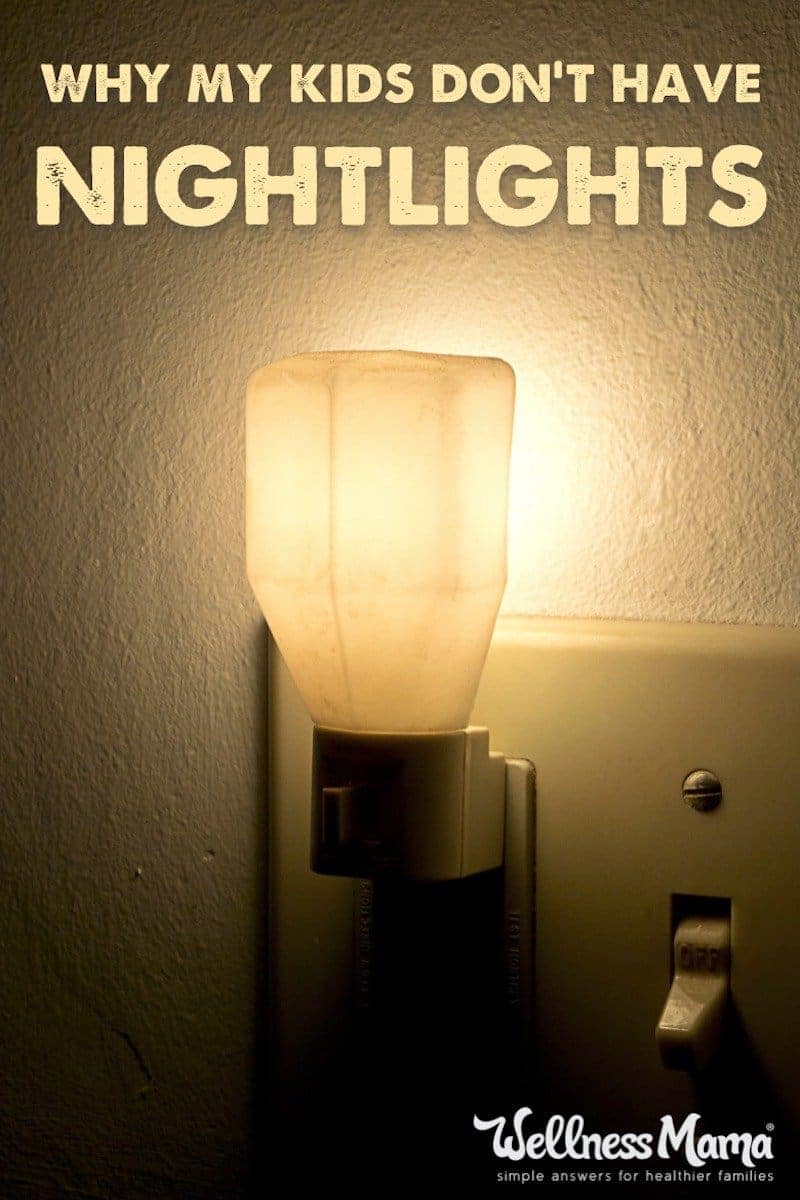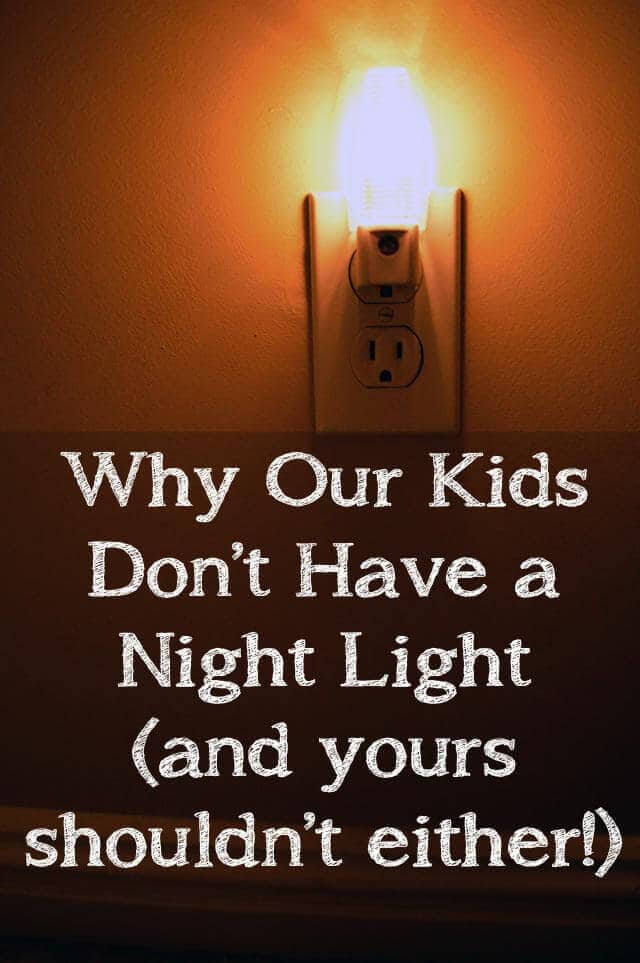I’ve written several times about the importance of sleep to overall health. One important aspect of this is to optimize the sleep environment and sleep in complete darkness. I’ve gotten emails from readers who noticed a profound difference in their sleep quality and energy/attitude by making this simple change (such as turning off the ever present night light). Please pardon me while I get on a soap box for a few minutes.
The Night Light: What’s the Problem?
Exposure to light during the night has been implicated in depression, increased cancer risk and decreased hormone function. As this post explains:
“Light inhibits the secretion of melatonin, a hormone that naturally promotes sleep. “Even if you doze off, light can be detected through your eyelids—and your brain won’t produce melatonin if it’s confused between night and day,” says Joyce Walsleben, PhD, associate professor at the New York University School of Medicine. ‘You want as much darkness in your bedroom as you can handle without tripping over things.’”
A good (cool and dark) night time environment is vital for hormone health, yet we often put lights in kids’ rooms. Only within the last 100 years has this even been a possibility. Before that, there was a natural cycle of light and darkness and while people might have had candles or lamps after dark, there would not have been lights on all night.
More and more research is emerging that shows a link between night time exposure to light and health problems. From this post:
“A report published by the CDC 11 years ago showed some fascinating evidence linking lack of sleep to cancer. The study reported that profoundly blind women had less than half the breast cancer risk of women with normal vision and profoundly blind men had less than half the risk of prostate, lung, colon and other cancers as normally sighted men.
Even more interesting, this reduced risk of cancer was not present in those who were legally blind but could still see light.
This led researchers to investigate the link between exposure to light (especially after the sun has gone down) and rates of disease.
Further studies revealed that night shift workers have higher rates of many diseases and that blue and green types of lights (from computers, TVs, alarm clocks, mobile phones, etc.) are the worst offenders.”
Importance for Kids
Night time light exposure can decrease sleep quality, but it can also shorten the duration of sleep, leading to further problems:
“Moreover Dr. Phyllis C. Zee, the director of the Sleep Disorders Center at Northwestern Memorial Hospital reports:
“There is growing evidence for a link between sleep duration and childhood obesity… [P]erhaps even more important than sleep duration is the effect of day to day variability of sleep wake timing on weight regulation.””
Harvard Medical School echoes some important reasons to get enough sleep:
- “Learning and memory: Sleep helps the brain commit new information to memory through a process called memory consolidation. In studies, people who’d slept after learning a task did better on tests later.
- Metabolism and weight: Chronic sleep deprivation may cause weight gain by affecting the way our bodies process and store carbohydrates, and by altering levels of hormones that affect our appetite.
- Safety: Sleep debt contributes to a greater tendency to fall asleep during the daytime. These lapses may cause falls and mistakes such as medical errors, air traffic mishaps, and road accidents.
- Mood: Sleep loss may result in irritability, impatience, inability to concentrate, and moodiness. Too little sleep can also leave you too tired to do the things you like to do.
- Cardiovascular health: Serious sleep disorders have been linked to hypertension, increased stress hormone levels, and irregular heartbeat.
- Disease: Sleep deprivation alters immune function, including the activity of the body’s killer cells. Keeping up with sleep may also help fight cancer.”
The research I’ve seen shows that white and blue lights are especially harmful at night since these are the same colors of light that the body would be exposed to during the day and they trick the body in to thinking it is day time.
What to Do About It
Making the change to complete darkness as an adult is a relatively easy process that mainly involves figuring out how to make the bedroom dark. The process isn’t always so easy for children, especially for children who are used to a night light or who have a fear of the dark.
With all the research showing the importance of night time darkness, I felt strongly that this was something I wanted my kids to do. It took a little time to get all of the kids used to sleeping in darkness, but we finally have.
We converted our kids’ bedrooms to better sleep environments by:
- Removing night lights, alarm clocks, etc
- Keeping the house cooler at night to facilitate better sleep
- Covering windows with blackout curtains to cover artificial light from street lights and to help heating and cooling costs.
- Using sound machines to help them stay asleep
- Using red tone lights (like these Himalayan salt lamps that also clean the air) in hallways and bathrooms so they could see to go to the bathroom if needed but there wasn’t any blue or white light to disrupt sleep.
Helpful Tips
These tips were helpful along the way:
- The kids really liked the Himalayan Salt Lamps. We didn’t put these in their rooms, but they liked that there was light in the hallway and bathroom if they needed it.
- We use blackout curtains because we have artificial light outside and these also help with heating and cooling costs.
- Using sound machines helped sooth them to sleep and help them stay asleep. We use these machines with the kids because they can be plugged in instead of using batteries and the “rain” sound is a definite favorite.
- The first few nights making this switch with our oldest, we turned on the sound machine first and read to him with the light on. Then, we turned off the light but left the door open with the salt lamp in the hallway. From here, we slowly worked up to putting him to sleep with the door closed and complete darkness.
- Avoiding TV at night also helped. The blue light from TV suppressed melatonin, making it harder for them to fall asleep.
- Letting older kids drink a cup of chamomile tea with a little honey (helps with any hypoglycemia issues) and some butter blended in to it. The healthy fats support hormone function and this combination has been great for sleep.
- Rubbing Magnesium Body Butter on their feet before bed (and putting socks on). The magnesium helps promote sleep and is beneficial in other ways too.
- Switching to organic mattresses also made a big difference for us, especially for our son who we were working on reversing allergies with. The light made a bigger difference, so I wouldn’t put new mattresses as the highest priority (we had to save for a long time for them) but they were helpful too.
- Explaining it to them: We’ve found that our kids often make healthy choices when given the information to help them do so. We talked to our older kids about the reasons night lights were not good for them and let them be involved in the decision to get rid of the night lights.
Do your kids have night lights? Ever thought about removing them? Share below!



Leave a Reply